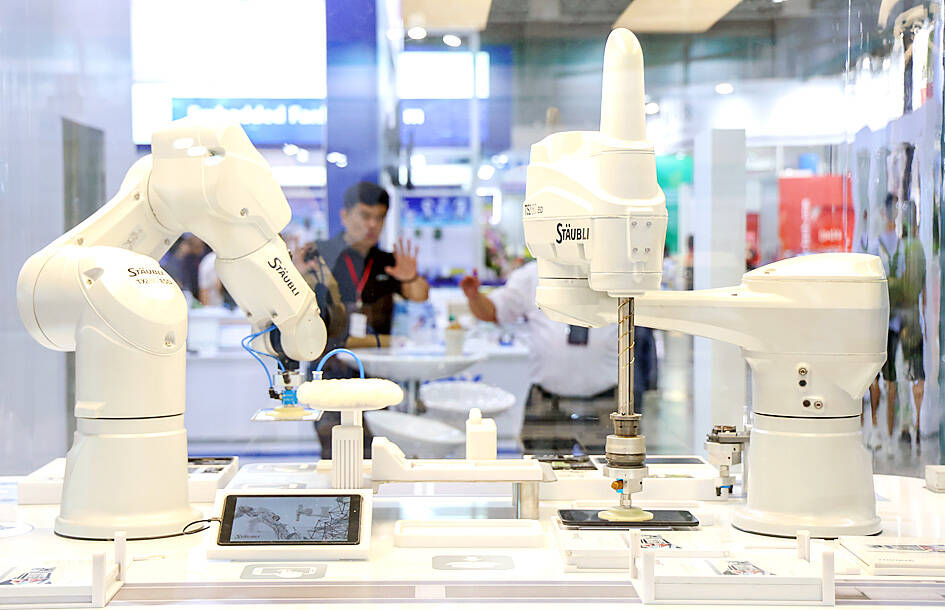Taiwan’s official manufacturing purchasing managers’ index (PMI) last month rose 1.4 points to 53.6, expanding for the fourth consecutive month, as most firms reported that business was improving, the Chung-Hua Institution for Economic Research (CIER, 中華經濟研究院) said yesterday.
A separate survey by S&P Global also showed that Taiwan’s factory activity last month remained healthy at 51.5, although moderating from July’s 52.9.
“Taiwan’s semiconductor firms continued to benefit from strong demand for electronics used in artificial intelligence” (AI), CIER president Lien Hsien-ming (連賢明) said.

Photo: CNA
However, some firms reported shipment slowdowns or delays due to chip design flaws at Nvidia Corp, Lien said.
That probably explained why chip testers and packagers, as well as other firms in the AI supply chain, reported business tapering somewhat, he said.
PMI data seek to shed light on the health of the manufacturing industry, with values of 50 or higher indicating expansion and below the threshold suggesting contraction.
The critical subindex on new business rallied 2.8 points to 56.7, while the measure on industrial output added 3.5 points to 57.4, the Taipei-based think tank said in its latest monthly report.
The robust state appeared industry-wide, except at firms involved in the supply of transportation tools as well as electricity and machinery equipment, given that they were hit by order retreats, the report said.
The reading on inventory levels rose 0.9 points to 49.9, while customers’ inventory lost 0.3 points to 44.3, it showed.
The gauge on the six-month business outlook shed 2.2 points to 52.8, the slowest uptick since February, as some firms turned cautious about uncertainty linked to the US presidential election, mixed economic data in the US and a lack of economic vigor in China, Lien said.
Lien said there was no need to worry about an unexpected economic downturn, as the operating environment remained positive, although momentum weakened a bit.
Specifically, selling prices for memory, base metal and chemical products showed signs of corrections, CIER researcher Chen Shin-hui (陳馨蕙) said.
S&P Global Market Intelligence economic researcher Paul Smith said Taiwanese firms appeared to be somewhat capacity constrained, but preferred to focus on raising productivity rather than expanding their workforces.
The result was another rise in backlogs of work, Smith said.
Firms generally signaled concern over the global economic outlook, a factor that was instrumental in pushing down overall sentiment to its lowest level of the year, he said.
Likewise, the vitality for Taiwan’s nonmanufacturing companies fell 2.8 points to 54.5, but was still comfortably above the expansion mark, the CIER said.
The figures followed active stock trading and housing deals, although a sizeable number of people spent the summer abroad, limiting sales for retailers and hospitality firms, it said.
Retailers and information and communication operators are looking at business deterioration ahead, but other service providers expect sales to pick up, the institute said.

AI BOOST: Although Taiwan’s reliance on Chinese rare earth elements is limited, it could face indirect impacts from supply issues and price volatility, an economist said DBS Bank Ltd (星展銀行) has sharply raised its forecast for Taiwan’s economic growth this year to 5.6 percent, citing stronger-than-expected exports and investment linked to artificial intelligence (AI), as it said that the current momentum could peak soon. The acceleration of the global AI race has fueled a surge in Taiwan’s AI-related capital spending and exports of information and communications technology (ICT) products, which have been key drivers of growth this year. “We have revised our GDP forecast for Taiwan upward to 5.6 percent from 4 percent, an upgrade that mainly reflects stronger-than-expected AI-related exports and investment in the third

Mercuries Life Insurance Co (三商美邦人壽) shares surged to a seven-month high this week after local media reported that E.Sun Financial Holding Co (玉山金控) had outbid CTBC Financial Holding Co (中信金控) in the financially strained insurer’s ongoing sale process. Shares of the mid-sized life insurer climbed 5.8 percent this week to NT$6.72, extending a nearly 18 percent rally over the past month, as investors bet on the likelihood of an impending takeover. The final round of bidding closed on Thursday, marking a critical step in the 32-year-old insurer’s search for a buyer after years of struggling to meet capital adequacy requirements. Local media reports

TECHNOLOGICAL RIVALRY: The artificial intelligence chip competition among multiple players would likely intensify over the next two years, a Quanta official said Quanta Computer Inc (廣達), which makes servers and laptops on a contract basis, yesterday said its shipments of artificial intelligence (AI) servers powered by Nvidia Corp’s GB300 chips have increased steadily since last month, should surpass those of the GB200 models this quarter. The production of GB300 servers has gone much more smoothly than that of the GB200, with shipments projected to increase sharply next month, Quanta executive vice president Mike Yang (楊麒令) said on the sidelines of a technology forum in Taipei. While orders for GB200 servers gradually decrease, the production transition between the two server models has been

ASE Technology Holding Co (日月光投控), the world’s largest integrated circuit (IC) packaging and testing supplier, yesterday announced a strategic collaboration with Analog Devices Inc (ADI), coupled with the signing of a binding memorandum of understanding. Under the agreement, ASE intends to purchase 100 percent shares of Analog Devices Sdn Bhd and acquire its manufacturing facility in Penang, Malaysia, a press release showed. The ADI Penang facility is located in the prime industrial hub of Bayan Lepas, with an area of over 680,000 square feet, it said. In addition, the two sides intend to enter into a long-term supply agreement for ASE to